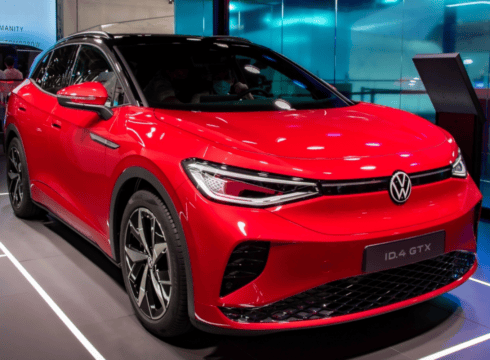Volkswagen is aiming to launch its premium electric SUV ID.4 next year to tap the fast-growing electric vehicle (EV) space in the country
The electric SUV would be assembled in India at the company’s Aurangabad plant, with parts and components imported
While existing players such as Tata Motors and Hyundai have their electric cars, Bhavish Aggarwal-led Ola Electric plans to launch its first e-car in 2024
Inc42 Daily Brief
Stay Ahead With Daily News & Analysis on India’s Tech & Startup Economy
German automobile giant Volkswagen reportedly plans to launch its first electric car in India next year. The company’s electric car would compete with similar offerings of Tata Motors, Hyundai, and Kia, as well as the soon-to-be-launched electric car of Bhavish Aggarwal-led startup Ola Electric.
A senior Volkswagen official told PTI on Tuesday (April 18) that the company would launch its premium electric SUV ID.4 to tap the fast-growing electric vehicle (EV) space in the country. The vehicles would be assembled in India at the company’s Aurangabad plant, with parts and components imported, as per the report.
The company expects 25%-30% of its total sales in India to come from EVs by 2030 and the rest from internal combustion engine vehicles.
Volkswagen is following a two-pronged strategy of premiumisation and electrification to strengthen its presence and enhance its position in India, Volkswagen Passenger Cars India Brand Director Ashish Gupta told the news agency.
Volkswagen India today showcased its ID.4 GTX electric SUV car at its Annual Brand Conference in Kochi, Kerala. The development comes amid Volkswagen strengthening its offerings for the internal combustion engine (ICE) market in India.
With the launch of new variants of its existing ICE car models in India, Volkswagen is looking at sales growth of 40%-45% this year.
While the company is planning to launch its EV in the county soon, Gupta also admitted that the ecosystem is not fully ready yet.
“The supply base is not ready. About 50% of the car cost of an electric car is the battery and unless mass localisation of battery manufacturing happens in India, none of the OEMs, not only us, will be able to do mass electrification,” he was quoted as saying.
However, he added that electrification in the domestic market would happen in steps and that it had to start now.
“You have to start doing it now to be able to bring a mass electric car, in the timelines that the industry is looking at somewhere in between 2026-27. That’s what most of the market is looking at in terms of mass electrification. We are looking at similar timelines,” Gupta was further quoted as saying.
It is pertinent to note that unlike the US and European markets, where EV adoption has largely been led by cars, electric two- and three-wheelers are leading the EV adoption in India.
Helped by the government’s push for EV adoption through its FAME-II scheme, sales of EVs in the two- and three-wheeler segments have seen a sharp rise over the last two years. The year 2022 was the best year in terms of EV sales.
Electric two-wheeler registrations in India grew to 6.3 Lakh units in 2022 from 1.5 Lakh in 2021. On the other hand, electric three-wheeler registrations grew to 3.5 Lakh units in 2022 from 1.6 Lakh.
While range anxiety remains a major concern for EV car adoption, particularly for interstate/long-distance travel, adoption in the segment is also picking pace slowly. Besides established players like Tata Motors and Hyundai, many new players are also emerging in the space.
Ola Electric announced last year that it would launch its first electric car in 2024. Besides, Bengaluru-based Pravaig is also manufacturing electric SUVs.
{{#name}}{{name}}{{/name}}{{^name}}-{{/name}}
{{#description}}{{description}}...{{/description}}{{^description}}-{{/description}}
Note: We at Inc42 take our ethics very seriously. More information about it can be found here.


